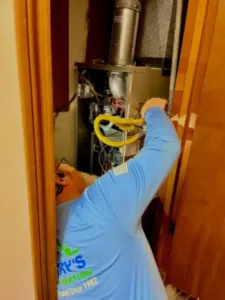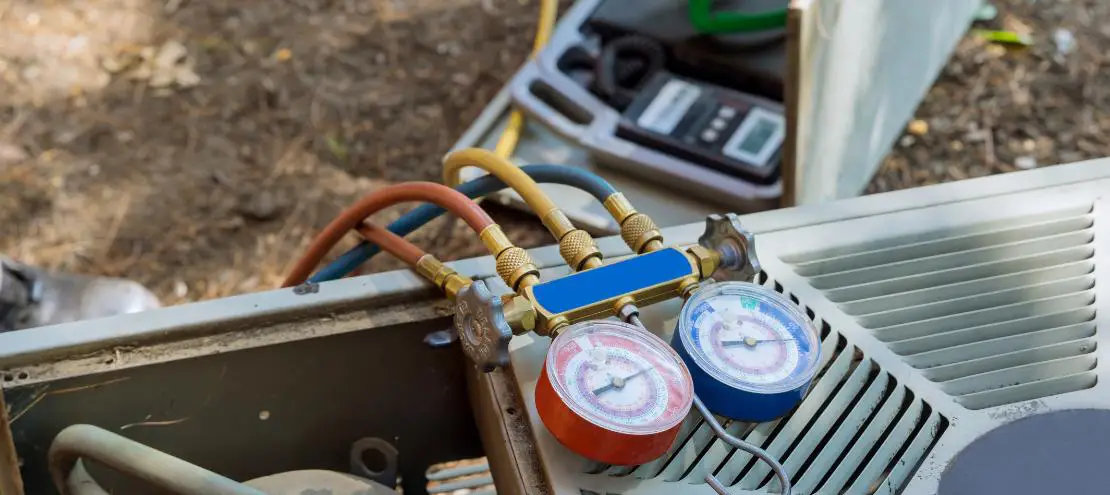Homeowner Tips: Benefits of HVAC Matched Systems
Owning a home requires a lot of learning as you go, including understanding why HVAC matched systems are a good idea.
A home’s heating and cooling system is probably one of the most hard-working appliances. Your HVAC system, which stands for heating, ventilation and air conditioning system, never gets a day off.
On Texas’ Gulf Coast in Richmond, Texas and the Greater Houston area, our winters are usually mild. The rest of the year is warm to hot with plenty of humidity. In a nutshell, we use our air conditioner a lot more than we use the heater.
Why Is Your Heating and Cooling System Called a Split System?
Split systems refer to the fact that residential HVAC systems have an indoor and an outdoor unit. The indoor unit, usually located in the attic or a hall closet, houses the blower unit and evaporator coil. The outdoor unit, on the other hand, is also called the condenser. Condensers are often located on the side of a home outdoors.
A mini-split works the same way, it’s just smaller. And, it is usually designed to heat and cool a smaller space.
Why Does a Heating and Cooling System Need to Match?
No reputable HVAC contractor is going to recommend installing an indoor and outdoor unit unless it matches. Manufacturers design indoor and outdoor HVAC systems to work together. Matching systems will work better together, be more efficient, cost less money to run, and last longer. Manufacturers can void warranties if unmatched HVAC systems are installed.
Indoor and outdoor units need to match in the following ways:
- Output – How much heat or cooling does your space require?
- Refrigerant – Split systems work together, so the refrigerant must be the same.
- Size – There are often choices about the size to fit your space requirements.
In the past, many HVAC system components could be mixed and matched. However, as technology has progressed and environmental regulations have gotten stricter, mixing and matching equipment is no longer possible. Mismatched heating and cooling systems are less efficient, and new regulations mean there are steep federal and Texas penalties to HVAC contractors for installing them.

Licensed HVAC Contractor and Terry’s A/C & Heating Owner Rob Terry checks a customer’s indoor unit located in a hall closet.
What do you mean by indoor and outdoor unit?
Most homes in the Houston, Texas area have the following configuration for their heating and cooling systems:
- Outside unit: Air conditioning condenser or Heatpump; Inside unit: Evaporator coil and furnace
- Outside unit: Air conditioning condenser or Heat pump; Inside unit: Air handler
How Do I Know If an HVAC System is a Matched System?
AHRI (Air-Conditioning, Heating, and Refrigeration Institute) certifies the efficiency of air conditioners and heat pumps and can provide proof that systems match with an AHRI Reference Number. This industry association functions as an unbiased third-party evaluator of each manufacturer’s equipment’s efficiency.
The AHRI number is a very important identification number like the VIN number on your car because it identifies what your system is and its performance capabilities. It can be used for homeowners and/or contractors to access rebates for high-efficiency equipment from local utilities and for tax incentives. Consider the incentives that CenterPoint Energy currently offers to residential HVAC contractors in the Houston Electric service distribution territory.
You can look up your equipment in the AHRI Directory of Certified Product Performance. This guide is available to the public, and any HVAC contractor should be able to help you navigate it to verify your heating and cooling system is matched correctly. Note: the website is not a simple one to navigate in our opinion.
Keep in mind that stricter DOE regulations require contractors install matching systems. This is why HVAC contractors will be offering matched HVAC systems if you are in need of a new one or your current system has a catastrophic failure.
Hazards of Not Purchasing a Matched System
If indoor and outdoor units are not matched properly, it can hamper the performance and energy efficiency of your HVAC system. It definitely will not live up to its energy efficiency potential. Not having a matched system can also void the manufacturer’s warranty. At worst, it can cause your heating and cooling system to not last as long as it should.
Energy efficiency standards are also becoming more strict. This means that heating and cooling systems are becoming more efficient and cost less to run. The downside is that it is sometimes it is harder to find parts/equipment and new technology is more expensive. (We did a complete run-down on some of the coming trends and regulations if you’re interested.)
We Can Help You with HVAC Matched Systems When You’re Ready
Most HVAC systems last between 10-15 years, but they do not last forever. If your heating and cooling system is reaching the end of its useful life, contact Rob and Summer at Terry’s A/C & Heating for a prompt quote on a new matched system to keep your family comfortable all year long. We are a Ruud Pro Partner™ and serve Richmond, Katy, Sugar Land, Fulshear, and Far West Houston. See all the areas we serve and call us today!


 For
For  Call Us:
Call Us:  Text Us:
Text Us: 



